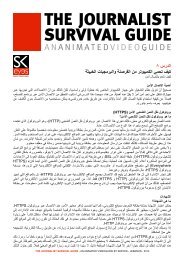JOURNALISTS' SECURITY IN WAR ZONES LESSONS FROM SYRIA
JOURNALISTS' SECURITY IN WAR ZONES LESSONS FROM SYRIA
JOURNALISTS' SECURITY IN WAR ZONES LESSONS FROM SYRIA
Create successful ePaper yourself
Turn your PDF publications into a flip-book with our unique Google optimized e-Paper software.
ConclusionIt is therefore primarily the responsibility of theindividual journalist to ensure he or she hassuch basic training and equipment before goinginto conflict zones. However, it was strongly theview at the conference that employers also havea responsibility to assist journalists in that respectby providing the equipment and by covering thecost of training staff reporters. It was felt thatemployers should likewise contribute to the effortsof freelancers to adopt the most important safetybehaviour and have adequate equipment. Such acommitment would save lives, prevent a situationwhere well qualified and experienced people arebeing driven away from the industry and, at thesame time, contribute towards maintaining highjournalistic standards.Other industries have seen groups of employeesrally together and, through collective bargaining,effect change and implement basic standardsthat improve both working conditions and staffsecurity. The news industry has been slow to dothe same.There is no shortage of awareness of the challengeswithin the industry, and, as set out above, thereare impressive initiatives by a multitude oforganisations to bring about improvements in theworking conditions of journalists. But, these effortsneed to be synchronised, and employers need tobe brought on board to ensure that minimumworking standards are established across theindustry. This is the challenge that lies ahead, butit is not insurmountable.First, practitioners need to agree on a set of minimumstandards to be observed by both journalists andemployers. This has been one of the key purposes ofthe three-day retreat sponsored by the Samir KassirFoundation. It is then up to journalists themselvesto drive this change forward. Collective bargainingdoes work, and, once a collective spirit materialisesamong journalists not to accept poor workingconditions, it is hoped that pressure can be builton employers to agree to such minimum standards.The campaign will need to show employers thatthey too will benefit from such an agreement; thatit is in their interest to keep journalists safe and toensure they have the means to do their job effectively.Moreover, media outlets that gain the reputationof being concerned for staff welfare will inevitablyattract better journalists. Also, both press freedomorganisations and governments have a role to play byproviding improved levels of support for journalistsand by ensuring that safety standards that apply forother sectors are implemented immediately withinnews organisations.There is no doubt that reporting from conflict zonesserves the public interest, a fact that is sometimeslost as the focus is put on more commercial, trivialnews. War reporters often lay the foundations forhow history will be written and events remembered.At the best of times, war correspondents have hada positive impact on policy decisions and providedwitness accounts for criminal proceedings; crimesfor which the perpetrators would never havebeen brought to justice otherwise. Such reportinghelps cut through opposing, often propagandistic,narratives and present facts as they really are. Itis in society’s interest to maintain the quality ofjournalism, and, by extension, it is in society’sinterest to have minimum working standards forall journalists working in conflict zones.27




